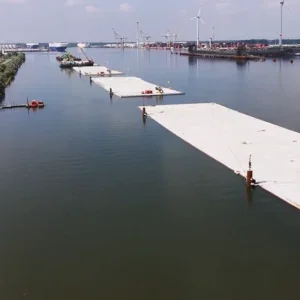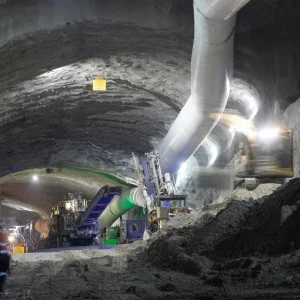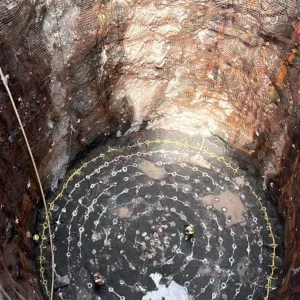As Africa’s largest oil exporter and its most densely populated country, Nigeria has huge potential in terms of building infrastructure that can enable diversification beyond its oil sector reliance. This in turn would boost economic activity and assist in the reduction of high levels of poverty. But its failure to invest in infrastructure has long been acknowledged as a huge barrier to growth. A lack of refinery facilities for example means that despite being hydrocarbon rich, petrol has to be imported. But there are signs that change is coming.
Earlier this year the minister of finance, Kemi Adeosun wrote (in the Financial Times) of the government’s intention to tackle corruption and reduce long term operational expenditure with the aim of redirecting this money into capital projects. Starting in the 2016 budget more than USD 6.77bn was channelled into this fund and more is expected. At the same time, the Minister acknowledged that the country had historically paid too high a price for its debt, which was borrowed over short tenures. This too would change, she said with more affordable borrowing being used for infrastructure investment.
Historic neglect in all sectors means that from water and wastewater, to energy and transport and communications infrastructure, the requirements are enormous; for with 190 million inhabitants Nigeria is the world’s seventh most populous country. Putting further pressure on this is a 2.6 per cent per annum population growth rate, and like other countries urbanisation is also rapidly putting ever increasing pressure on cities like Lagos, Abuja, Ibadan and Kano. Estimates on the value of infrastructure investment required were set out in the government’s National Integrated Infrastructure Master Plan at USD 3tr between 2014 and 2043. Current spending levels sit at around USD 10bn per annum, which has left it with a very low-level base of infrastructure asset capacity compared to other emerging markets.
UNDERGROUND POTENTIAL
For the tunnelling community therefore, a massive opportunity exists to create a new underground construction industry in Nigeria, provided the government and the public can be convinced of the value of exploiting the sky beneath their feet.
“In terms of the potential for the development of tunnelling and underground infrastructure in Nigeria, it is enormous,” says Abidemi Agwor, president of the recently established Tunnelling Association Nigeria (TAN). “The scale that is required is such that you would expect that we would replicate what is been currently happening in countries like China, India, Turkey and Indonesia. That is what we are looking to champion. That is what we are looking to plan.”
TAN, has a three-phase strategy for developing a Nigerian tunnelling industry. “The first is awareness creation. We will be looking to engage policy makers, decision makers, financial institutions through several different programmes, conferences, seminars and symposia,” he says, noting that Nigeria’s second annual tunnelling conference will take place in Abuja from 20 to 22 March.
“The second area is to educate. There is still a global shortage of tunnelling engineers. In Nigeria, we believe we can transfer skills from existing industries to suit the needs of the tunnelling industry, but it is going to be a long process,” he says noting that this is an area that requires much intentional focus and strategy. A third strand is in capacity building through the growth of both local manpower and supply chain businesses that would contribute to the birth and maturity of new industry.
“The ultimate target at the end of the 10 years is for us as a country to be able to deliver 50 per cent locally of what would be required for a medium size project of less than USD 100M.”
One of the ways in which the TAN plans to support growth of the technical skills base is through collaboration with International Tunnelling and Underground Space Association partners in other member nations. TNA became the 74th member of the ITA at the World Tunnelling Congress in Bergen in June 2017. “That would mean supporting some of our bright talent to gain some technical experience on the different tunnelling and underground specialised programmes with different Universities endorsed by the ITA,” says Agwor, who himself was a beneficiary of a scholarship from the Rivers State Government which enabled him to move to the UK to study in 2008. “We are also looking at the prospect of exchange options where we could have students with a six-month exchange excellence programme on projects to gain some real-life project experience.” Private universities in Nigeria have been quick to respond to the plans, and TAN is seeking to expand on this with state universities involved too.
Along with its three-phased strategy TAN is also working on a number of milestones through its 10-year plan. The first, and current milestone is the concept phase and in three to four years Agwor hopes that the country moves into the delivery phase. Beyond this will be an operational phase.
NEW OPPORTUNITIES
To date the country’s experience of tunnelling has been limited to small sale trenchless technologies for pipe placement, and cut and cover for underpass construction. “Tunnelling is not an alien process in terms of the underground. We have had the opportunity to develop in recent times a flood relief system in southern parts of the country as well as a few underpasses in Lagos. But it is relatively new to us on the scale that would impact the level of infrastructure that we should have in the country as a whole,” says Agwor.
The first major project expected to involve large scale tunnelling is the 3,050MW Mambilla hydropower scheme at Gembu in the state of Taraba. A Chinese consortium of Sinohydro Corporation Limited, CGCOC Group Co, and led by China Gezhouba Group Company (CGGC) will carry out construction and delivery of the scheme. The cost of the project is USD 5.8bn and Agwor estimates that around 33km of tunnelling is required. “It is predominantly in the northern part of Nigeria where there is hard rock. The projection for now is to use TBMs,” says Agwor. As this could potentially be Nigeria’s first major tunnelling project TAN is keen to see local involvement in the scheme in order to begin capacity building in Nigeria.
This would of course help to support tunnelling in other locations, says Agwor, explaining that his passion for tunnelling in the country is driven by the enormous need for it. “Africa is already 40 per cent urbanised and it has been stated that 90 per cent of the population will be living in urban centres in the next 20 to 25 years and so for me that is critical to a country like Nigeria when it comes to water distribution, sewage management, power distribution, utilities, telecoms, these are things that are required in terms of social amenity.”
As the nation’s largest city in population terms, Agwor expects that a forthcoming tunnelling boom will be rooted in Lagos. “In terms of developing an integrated water and metro system Lagos will probably be the first to deliver that scale of project and there are plans ongoing as we speak.”
A seven-line metro system is indeed under construction and the first line of this, the blue line is approaching completion, again by Chinese contracting firms. “All were proposed to be surface but there is an organisation looking at the prospect of an underground approach to some of the lines. That would optimise infrastructure into Lagos.
This would involve tunnelling in peat, silts and sand that overlies the bedrock of Lagos mainland, however given the limited underground construction experience that the city has Agwor has proposed that some more research is undertaken to create a geologic baseline report. This would provide some valuable insight into ground characteristics across Lagos and Nigeria as a whole. This information could then be used to produce better cost estimates for projects and therefore increase the potential for securing development agency funding.
“The baseline is for concept, planning and budgeting. Then when you decided you want to have infrastructure you can increase this by having full investigations,” says Agwor.
Another major opportunity for tunnelling exists around Lagos’ Apapa Port, where severe congestion can see trucks held up for weeks at a time. Improving transport links with tunnels for would greatly increase port efficiency and contribute to further economic growth.
Boosting economic growth is key for Nigeria which slipped into recession in 2016 for the first time in two decades. This was caused by the persistently low oil prices, a reduction in production rates, foreign exchange shortages and disruptions in fuel supply. Although a moderate recovery was expected in 2017 the past two years have been challenging.
But as Agwor points out, this makes it all the more important that the country invests in new underground infrastructure. “The government is really keen on diversifying the economy so there is a lot going in to agriculture, product manufacturing, the entertainment industry as well as the construction industry. In terms of different financing models like PPP the government is a lot more flexible. It is a case of creating an enabling environment and making sure that the policies and frameworks are in place to give confidence to potential foreign investors but the current main priority is to develop and expand our infrastructure base.”







